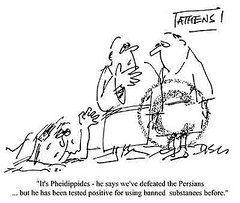Barry O'Farrell MP
Deputy NSW Liberal Leader, Shadow Minister for Transport, Shadow Minister for Waterways
Latest figures show rail workers who are randomly tested are 15 times more likely to test positive for illegal drugs than test positive for alcohol, Shadow Minister for Transport Barry O’Farrell said today.
Random alcohol testing began in October 2003. Since then 63,208 tests have been carried out with 76 staff returning a positive result, 38 of which were above 0.05.
Random drug testing began in April 2004. A total of 6,524 tests have been conducted with 115 staff returning positive results.

1 comment:
“Despite the fact there have been nearly ten times more random alcohol tests, 39 more workers have tested positive for illegal drugs,” Mr O’Farrell said.
“Rail workers are 15 times more likely to test positive for illegal drugs compared with alcohol,” he said.
“When commuters step onto the train network, they place their lives in the hands of the workers who staff the rail system. Workers who abuse that trust and endanger the lives of the travelling public must face the consequences.”
Mr O’Farrell criticised the State Government’s failure to publish what, if any action, was taken against RailCorp employees who registered positive alcohol or drug tests.
“Commuters have a right to know that any rail workers who test positive to either alcohol or drugs are immediately stood down from their positions,” he said.
“Currently commuters are left in the dark as to what, if any, punishment is handed out to those rail workers who test positive to illegal drugs.”
Mr O’Farrell said the CityRail website confirmed ‘train crew’ were amongst those staff who tested positive to illegal drugs.
“The Government needs to detail how staff are disciplined when they return a positive drug test and whether they are given access to rehabilitation programs.
“If the State Labor Government was serious about getting more commuters back onto trains, it would make public the disciplinary actions it has taken against those workers who have endangered the public,” Mr O’Farrell said.
Post a Comment